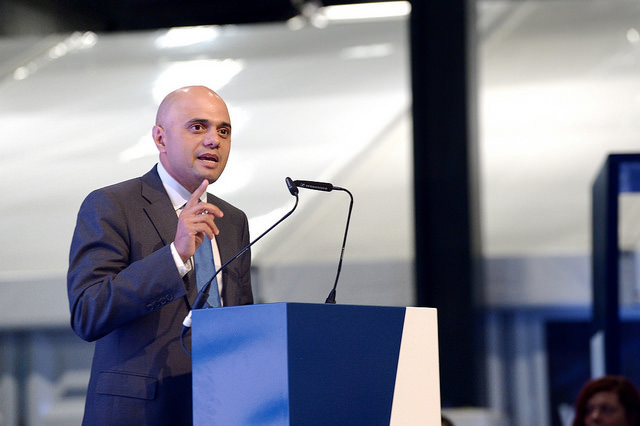
(Photo: Richter Frank-Jurgen/Creative Commons)
The key to success is to maximise your opportunities. This has certainly been the case with regards to Sajid Javid. This son of a Pakistani bus driver was in the right place to replace former Conservative MP Julie Kirkbride in 2010 after she was forced to step down from her safe Parliamentary seat of Bromsgrove following issues with her expenses. Within four years of being first elected, he was given his first cabinet post as Culture Secretary, taking over from Maria Miller, who was also forced to resign in an expenses scandal. When Amber Rudd was eventually forced out of office at the end of last month, Javid was there once again, ready to replace her and become the first Muslim to hold one of the four great offices of state.
It has been a meteoric rise for the new Home Secretary, who has been widely welcomed in his unique position of being the first ethnic minority to hold such a senior Government post. His first priority was to help the Windrush generation, victims of the Government’s hostile environment immigration policy (despite voting for the controversial Immigration 2014 Act). “I thought that it could be my mum, my brother, my uncle or even me,” he said about the mistaken expulsions at the most appropriate time.
The art of any politician is to be astute and have the ability to adapt even if the approach may appear to lack consistency or ethics. The new 48-year-old incumbent has proved to be quite nimble. Will he be able to face challenges in his new job as is also set to develop a new immigration policy in the what is likely to be a rather intimidating post-Brexit period?
Brexit has contributed to a “growing acceptability of intolerance and racist speech”, the UN Special Rapporteur on Racism, Tendayi Achiume, warned at the end of her mission to the UK earlier this month.
Home Secretary tends to be one of the most difficult Government jobs, burdened also with the responsibilities of social problems and criminality, including drugs and current surge in knife crime as well as counter-terrorism and policing. So often it has been seen as a poisoned chalice that has led to the ruin of many ministers. It has also become a department in the frontline of relations with Muslims.
By his own admission, Javid is a “proud British-born Muslim” though not practising. He is on record saying that if he had to leave Britain to live in the Middle East, he would choose Israel as his home – a position unlikely to win many plaudits within Muslim communities. Previously he made his family financially comfortable working largely globally at Chase Manhattan than at Deutsche Bank before turning to politics. He is accredited with having a special admiration for former Prime Minister, Margaret Thatcher.
With such a background, he served as Economic Secretary to the Treasury in his first ministerial role before becoming Financial Secretary to the Treasury and later was promoted to Business Secretary.
If, as has been suggested that Javid could rise right to the top, his time as Home Secretary possibly would need to pave the way to prove he is a credible candidate. As such he could do no worse than rewriting or redirecting the Government’s long-lost misguided anti-terrorism policies. Previous promises to overhaul the whole host of draconian legislation have yet to see any light. Being Muslim, he has the potential to bring with him a particular insight, receptive to the way the community has been deceptively targeted.
High in his in-tray must be reforming, if not scrapping, the controversial Prevent extremism programme that unwarrantedly perceives Muslims through the eyes of terrorism from cradle to grave. The Government has been repeatedly warned of the damage being caused to community relations from the alienation caused by such intense surveillance. Muslims are not only being treated as potential subversives but also as third-class citizens.
Another top priority is to curb the abuse of the much-maligned Schedule 7 powers enacted under the Terrorism Act 2000. Authorities at ports and airports have sweeping powers to search and interrogate individuals for up to six hours entering and leaving Britain without any grounds for suspicion. Between 2009 and 2016, over 400,000 so-called ‘examinations’ have been carried out, equivalent to 137 every day, yet it leads to very few arrests. Among others, Liberty has described the law as “breathtakingly broad and intrusive” and said ethnic minorities were disproportionately targeted with Asians 42 times more likely to be stopped than white people.
In his unique position, Javid could possibly transform relations with the country’s more than 2.7 million Muslims. The community is rich in talent as once again last month’s Muslim News Awards have shown. As a start, the Home Secretary could help to set a new tone and change some of the terminologies that insinuate Islam is somehow defective and to blame for many of the social and political problems.
The huge surge in anti-Muslim hate crime is another area that the new Home Secretary can give his attention to. On a financial level, he could do something about the paltry £3.4 m funding originally provided to help to protect Muslim places of worship over three years. But more so, Javid could help his Parliamentary Undersecretary, Victoria Atkins, to get to the bottom of why there has been a drop of 1,000 in the number of prosecutions of hate crime in the past two years when anti-Muslim hate crimes alone have risen by 40%.
At The Muslim News, we warmly congratulate Sajid Javid in his unprecedented position, where he has the potential to make real change and turn around the perception that this Government primarily perceives Muslims through the lens of security
We must give him time to find his feet but Muslim communities are longing for change. Let us hope Javid can be the one to deliver it.